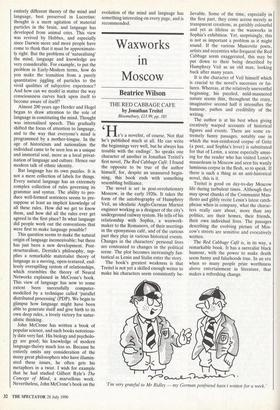Waxworks in Moscow
Beatrice Wilson
THE RED CABBAGE CAFE by Jonathan Treitel
Bloomsbury, £13.99, pp. 183
e's a novelist, of course. Not that he's published much at all. He can write the beginnings very well, but he always has trouble with the endings'. So speaks one character of another in Jonathan Treitel's first novel, The Red Cabbage Cafe. I found the opposite to be true of the author himself, for, despite an unassured begin- ning, this book ends with something resembling brilliance.
The novel is set in post-revolutionary Moscow, in the early 1920s. It takes the form of the autobiography of Humphrey Veil, an idealistic Anglo-German Marxist engineer working as a designer of the city's underground railway system. He tells of his relationship with Sophia, a waxwork- maker to the Romanovs, of their meetings in the eponymous cafe, and of the curious part they play in various historical events. Changes in the characters' personal lives are contrasted to changes in the political scene. The plot becomes increasingly fan- tastical as Lenin and Stalin enter the story.
The book's greatest weakness is that Treitel is not yet a skilled enough writer to make his characters seem consistently be-
lievable. Some of the time, especially in the first part, they come across merely as transparent creations, as garishly colourful and yet as lifeless as the waxworks in Sophia's exhibition. Yet, surprisingly, this is not as important a problem as it might sound. If the various Muscovite poets, artists and eccentrics who frequent the Red Cabbage seem exaggerated, this may be put down to their being described by Humphrey Veil as an old man, looking back after many years.
It is the character of Veil himself which is crucial to the novel's successes or fai- lures. Whereas, at the relatively uneventful beginning, his puzzled, mild-mannered nature seems thin, throughout the crazy, imaginative second half it intensifies the humour, pathos and credibility of the writing.
The author is at his best when giving creatively warped accounts of historical figures and events. There are some ex- tremely funny passages, notably one in which the wax-reinforced corpse of Gritz (a poet, and Sophia's lover) is substituted for that of Lenin, a scene especially amus- ing for the reader who has visited Lenin's mausoleum in Moscow and seen his waxily luminous corpse in the flesh, so to speak. If there is such a thing as an anti-historical novel, this is it.
Treitel is good on day-to-day Moscow life during turbulent times. Although they may spout chunks of the Communist Man- ifesto and glibly recite Lenin's latest catch- phrase when in company, what the charac- ters really care about, more than any politics, are their homes, their friends, their own individual lives. The passages describing the evolving picture of Mos- cow's streets are sensitive and evocatively written.
The Red Cabbage Cafe is, in its way, a remarkable book. It has a surrealist black humour, with the power to make death seem funny and falsehoods true. In an era when so many people prize worthiness above entertainment in literature, that makes a refreshing change.


















































 Previous page
Previous page